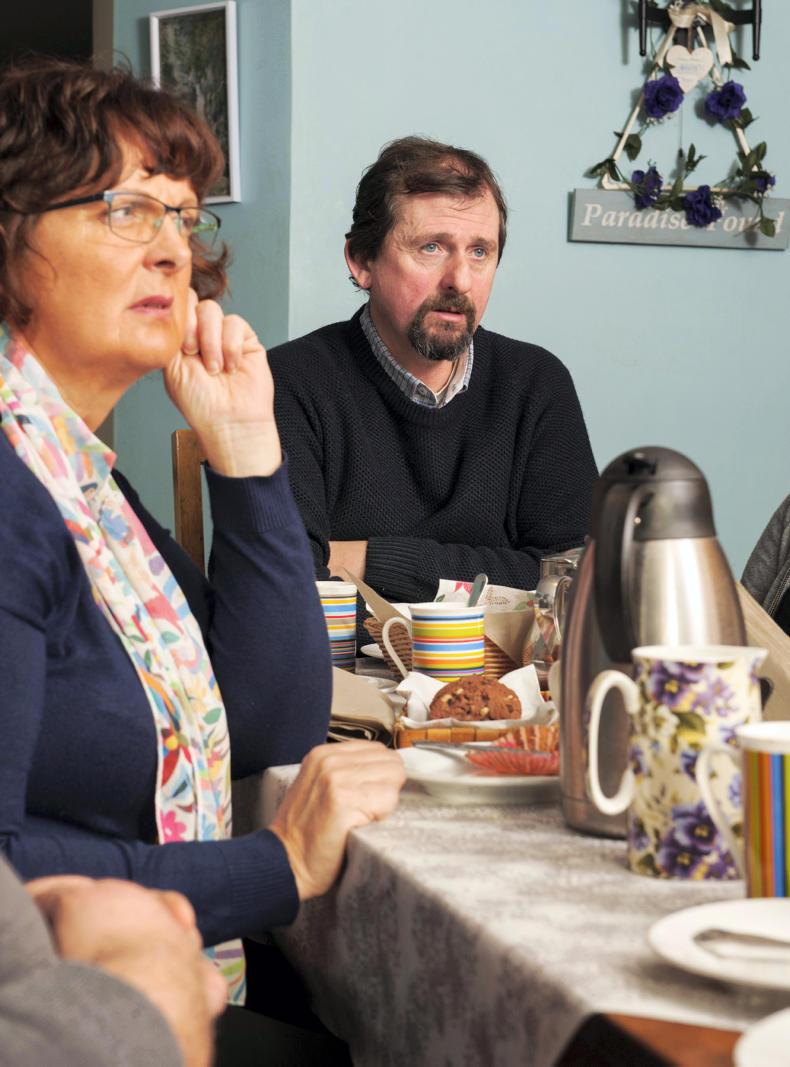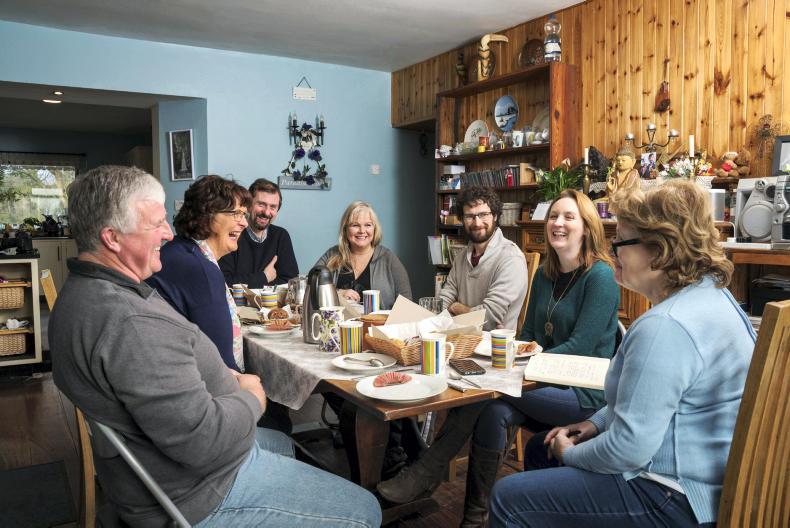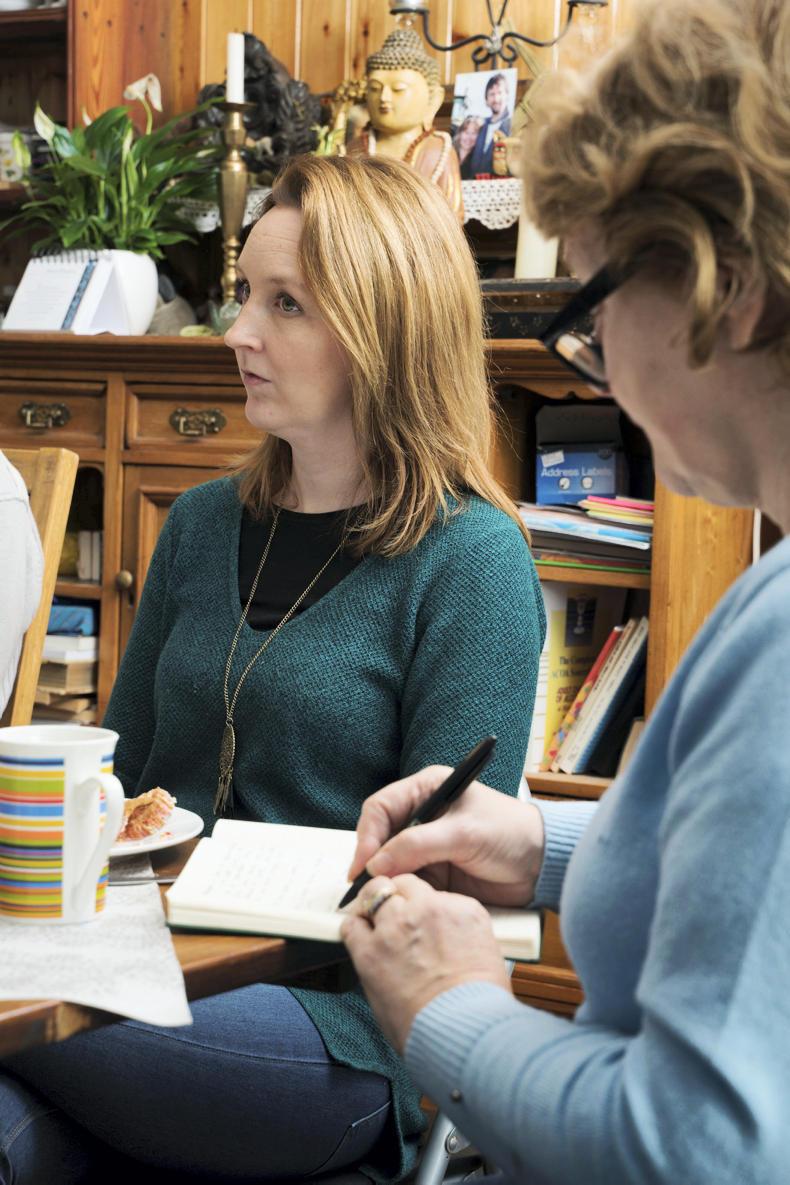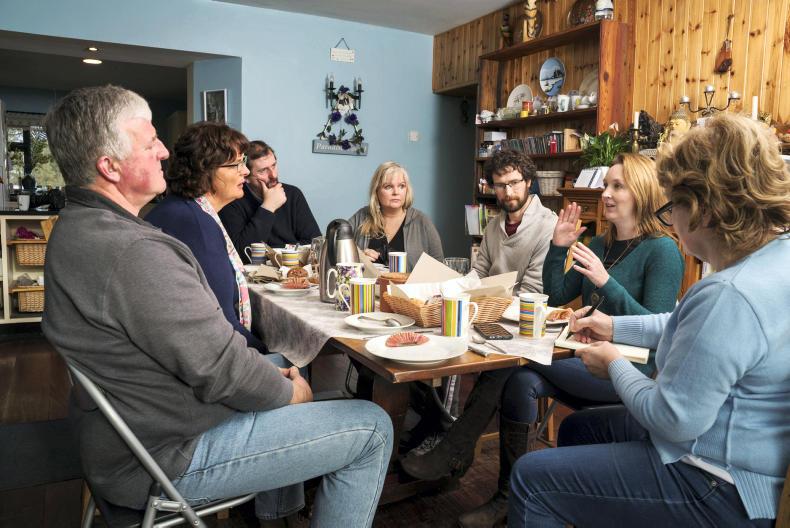It was a cold January morning as a small group of farmers gathered in Anna and Oliver Dixon’s snug kitchen in the townland of Ahena, near Claremorris in Co Mayo. The purpose of the gathering was to chat about how farming and their communities have changed in the past 10 years and what they think might happen in the future.
The group included a large-scale dairy farmer, an organic vegetable producer, an equestrian centre owner and suckler farmer, and an organic beef and lamb farmer. What made the group unusual is that they are all involved in social farming.

Big changesHosts Oliver and Anna Dixon changed to organic suckler-to-beef production in 2010.
“Change has its challenges but the changes we made certainly renewed my interest in farming. However, even though €4.60/kg is a good price, you won’t finish cattle over the winter for that, especially with organic meal costing €500 a ton,” says Oliver.
Outside of farming Oliver works as a psychotherapist and has been doing this since 2004. He says psychotherapy is a humanistic way of treating the person as a whole.
“There’s still a stigma attached to being in therapy and I know this because I was in therapy for depression.”
Looking at how farming and community life has changed, he reckons farming is now more isolating than most occupations.
“There’s a heavy workload and plenty of responsibility and we are more on our own now than in the past. That can be stressful but sadly we are not good at looking after our wellbeing, especially our mental wellbeing.”
Career portfolio
Anna describes herself as the “stand-in-a-gap woman” but she is also an art teacher and acupuncturist. Social farming is a sign of changing times she says. The family welcomed two Syrian refugees last autumn. Both were farmers who came one day a week and worked with the cattle and in the orchard and vegetable garden. The project will feature on the website of the United Nations High Commission for Refugees and on Ear to The Ground.
Nutrient-rich food
Joe and Aoife Reilly own Glasraí organic vegetable farm near Hollymount. They sell in local markets and also supply a couple of cafes and hotels. They have three polytunnels and the farm extends to seven acres. Joe grew up on a dairy and beef farm and qualified as a carpenter. Last year he took on two apprentices and this year he has two people working full time as well as apprentices.
In contrast to conventional farming, Joe sees a bright future for the organic vegetable sector.

“Around here fewer people are farming and dairy is getting bigger. The rest are struggling, especially the beef farmers. I have friends who are pulling their hair out worrying where it will all end.”
Joe says the demand is there for organic produce: “Small-scale growers could feed a village. We produce nutrient-dense food, value food. I see a lot of small-scale operators starting up. The apprentices I had last year had no horticultural background and are now both working in the sector.”
Technology will tell
He says in the near future an app linked to a hand-held scanner will tell shoppers the nutrient value of the food they are buying.
“These are already available but out of reach of most people’s pockets but that won’t be long changing,” he says.
“In the 1990s there were two people giving professional massages in Westport, now there’s up to 30 doing it and they are all making a living. The same could apply to vegetable production in the area.”
The Reillys started social farming in 2017 with two participants who access services from Western Care, Ballinrobe. The participants spend one day a week on the farm and enjoy packing and picking vegetables and socialising with the family and staff.

Large-scale dairyJennifer and Ed Payne are dairy farming near Tulsk, Co Roscommon. They started social farming in late 2018 when Jennifer welcomed a participant from Teach Solas, Longford.
“We started with the first participant last year and we are big into it now. I think social farming has a huge place on bigger farms. People come and get some experience with the horses and garden. They get a chance,” she says.
Sucklers and sheep were the enterprises on the home farm but Ed and Jennifer switched to dairying and the first dairy calf was born a few weeks after they moved in. They are now milking 520 cows on two farms, with one of the herds being milked once a day.
“We grew cow numbers quickly and that was stressful. Once-a-day milking means we are less time poor. We have high constituents from the once-a-day system and that’s what we are paid on. It suits us and the cows and we can swap out if needs be.”
Looking ahead, Jennifer feels that farmers need to become better employers.
“Why is there such a shortage of farm labour? We need to make farming more attractive. Farmers need to become better employers. We need to understand our responsibilities.”
World-class equestrian centre
Sean and Teresa O’Connell are suckler farmers and also own Ower Equestrian Centre, in Roscahill, Co Galway. The centre has one of the biggest indoor training facilities in the country, with an international-sized arena for dressage. It opened last September and it was the first time Dressage Ireland competed in Galway. The centre also ran the working hunter qualifiers for the first time last year.
Sean started social farming in 2017 with participants who access services from the Brothers of Charity and Ability West Galway. His is currently the only social farm in the west to have welcomed wheelchair users.
Diversification has been important for the business says Sean. “We have been working with Galway West Special Olympics and their needs helped drive us to doing therapeutic riding for children with profound needs. These children never ask for anything and working with them is so much more than a business.”

Looking ahead
For Oliver and Anna the key to surviving on the farm has been diversification.
“The challenge for rural Ireland is to be financially viable and hold on to what we have. There’s a lot of land in the west of Ireland but most of it isn’t suitable for cereals or dairying. The suckler cow is the bedrock of farming in these parts. But to stay in business you must diversify.
We are trying to be as open as possible and we invite people in to see what’s happening on the farm
“We have gone over to organic and social farming and forestry is coming on stream. We incorporate all that with the holistic centre and the therapy work. If we had left it the way it was, I’d be here alone all day, mumbling to myself and the dog.”
For Jennifer, a challenge for the future is people’s perception of farming and farmers.
“We are trying to be as open as possible and we invite people in to see what’s happening on the farm. We even have visits from crèches and primary schools.” She loves living in rural Ireland and says newbies need to put themselves out there if they want to make friends and fit in.
Sean O’Connell prefers not to look too far ahead. However, he does wonder if the next generation will have the same commitment to the land.
“They won’t go farming. We are just seen as farmers and there is no real respect for our skills. If we had stayed suckling I don’t think any of the family would have stayed local, but three of them are involved in the equestrian business.”
In 10 years’ time, Joe Reilly would like to have a farm shop and see a vegetable farmer in every village in the country.
“Managing and retaining staff isn’t easy but if you don’t have staff you don’t have time and you will get burnt out. You want people to take responsibility and we would consider going into shared farming to get that.”
Thanks to Margaret Leahy, Social Farming regional officer for Mayo, Galway and Roscommon who organised the chat and brought cake.
Final words
Competitive insurance is essential for on-farm diversification.Authorities don’t take into account the nature of farming with its constant ups and downs.Getting a business off the ground faces a wicked amount of red tape.Entrepreneurship is not encouraged and you are never finished with regulations.Everyone has a vested interest in keeping farmers going. They are the last man on the rope.Want to chat?
If you’d like to host a chat around your kitchen table, give Mairead Lavery a call on 087-7976310. I promise to bring cake.
It was a cold January morning as a small group of farmers gathered in Anna and Oliver Dixon’s snug kitchen in the townland of Ahena, near Claremorris in Co Mayo. The purpose of the gathering was to chat about how farming and their communities have changed in the past 10 years and what they think might happen in the future.
The group included a large-scale dairy farmer, an organic vegetable producer, an equestrian centre owner and suckler farmer, and an organic beef and lamb farmer. What made the group unusual is that they are all involved in social farming.

Big changesHosts Oliver and Anna Dixon changed to organic suckler-to-beef production in 2010.
“Change has its challenges but the changes we made certainly renewed my interest in farming. However, even though €4.60/kg is a good price, you won’t finish cattle over the winter for that, especially with organic meal costing €500 a ton,” says Oliver.
Outside of farming Oliver works as a psychotherapist and has been doing this since 2004. He says psychotherapy is a humanistic way of treating the person as a whole.
“There’s still a stigma attached to being in therapy and I know this because I was in therapy for depression.”
Looking at how farming and community life has changed, he reckons farming is now more isolating than most occupations.
“There’s a heavy workload and plenty of responsibility and we are more on our own now than in the past. That can be stressful but sadly we are not good at looking after our wellbeing, especially our mental wellbeing.”
Career portfolio
Anna describes herself as the “stand-in-a-gap woman” but she is also an art teacher and acupuncturist. Social farming is a sign of changing times she says. The family welcomed two Syrian refugees last autumn. Both were farmers who came one day a week and worked with the cattle and in the orchard and vegetable garden. The project will feature on the website of the United Nations High Commission for Refugees and on Ear to The Ground.
Nutrient-rich food
Joe and Aoife Reilly own Glasraí organic vegetable farm near Hollymount. They sell in local markets and also supply a couple of cafes and hotels. They have three polytunnels and the farm extends to seven acres. Joe grew up on a dairy and beef farm and qualified as a carpenter. Last year he took on two apprentices and this year he has two people working full time as well as apprentices.
In contrast to conventional farming, Joe sees a bright future for the organic vegetable sector.

“Around here fewer people are farming and dairy is getting bigger. The rest are struggling, especially the beef farmers. I have friends who are pulling their hair out worrying where it will all end.”
Joe says the demand is there for organic produce: “Small-scale growers could feed a village. We produce nutrient-dense food, value food. I see a lot of small-scale operators starting up. The apprentices I had last year had no horticultural background and are now both working in the sector.”
Technology will tell
He says in the near future an app linked to a hand-held scanner will tell shoppers the nutrient value of the food they are buying.
“These are already available but out of reach of most people’s pockets but that won’t be long changing,” he says.
“In the 1990s there were two people giving professional massages in Westport, now there’s up to 30 doing it and they are all making a living. The same could apply to vegetable production in the area.”
The Reillys started social farming in 2017 with two participants who access services from Western Care, Ballinrobe. The participants spend one day a week on the farm and enjoy packing and picking vegetables and socialising with the family and staff.

Large-scale dairyJennifer and Ed Payne are dairy farming near Tulsk, Co Roscommon. They started social farming in late 2018 when Jennifer welcomed a participant from Teach Solas, Longford.
“We started with the first participant last year and we are big into it now. I think social farming has a huge place on bigger farms. People come and get some experience with the horses and garden. They get a chance,” she says.
Sucklers and sheep were the enterprises on the home farm but Ed and Jennifer switched to dairying and the first dairy calf was born a few weeks after they moved in. They are now milking 520 cows on two farms, with one of the herds being milked once a day.
“We grew cow numbers quickly and that was stressful. Once-a-day milking means we are less time poor. We have high constituents from the once-a-day system and that’s what we are paid on. It suits us and the cows and we can swap out if needs be.”
Looking ahead, Jennifer feels that farmers need to become better employers.
“Why is there such a shortage of farm labour? We need to make farming more attractive. Farmers need to become better employers. We need to understand our responsibilities.”
World-class equestrian centre
Sean and Teresa O’Connell are suckler farmers and also own Ower Equestrian Centre, in Roscahill, Co Galway. The centre has one of the biggest indoor training facilities in the country, with an international-sized arena for dressage. It opened last September and it was the first time Dressage Ireland competed in Galway. The centre also ran the working hunter qualifiers for the first time last year.
Sean started social farming in 2017 with participants who access services from the Brothers of Charity and Ability West Galway. His is currently the only social farm in the west to have welcomed wheelchair users.
Diversification has been important for the business says Sean. “We have been working with Galway West Special Olympics and their needs helped drive us to doing therapeutic riding for children with profound needs. These children never ask for anything and working with them is so much more than a business.”

Looking ahead
For Oliver and Anna the key to surviving on the farm has been diversification.
“The challenge for rural Ireland is to be financially viable and hold on to what we have. There’s a lot of land in the west of Ireland but most of it isn’t suitable for cereals or dairying. The suckler cow is the bedrock of farming in these parts. But to stay in business you must diversify.
We are trying to be as open as possible and we invite people in to see what’s happening on the farm
“We have gone over to organic and social farming and forestry is coming on stream. We incorporate all that with the holistic centre and the therapy work. If we had left it the way it was, I’d be here alone all day, mumbling to myself and the dog.”
For Jennifer, a challenge for the future is people’s perception of farming and farmers.
“We are trying to be as open as possible and we invite people in to see what’s happening on the farm. We even have visits from crèches and primary schools.” She loves living in rural Ireland and says newbies need to put themselves out there if they want to make friends and fit in.
Sean O’Connell prefers not to look too far ahead. However, he does wonder if the next generation will have the same commitment to the land.
“They won’t go farming. We are just seen as farmers and there is no real respect for our skills. If we had stayed suckling I don’t think any of the family would have stayed local, but three of them are involved in the equestrian business.”
In 10 years’ time, Joe Reilly would like to have a farm shop and see a vegetable farmer in every village in the country.
“Managing and retaining staff isn’t easy but if you don’t have staff you don’t have time and you will get burnt out. You want people to take responsibility and we would consider going into shared farming to get that.”
Thanks to Margaret Leahy, Social Farming regional officer for Mayo, Galway and Roscommon who organised the chat and brought cake.
Final words
Competitive insurance is essential for on-farm diversification.Authorities don’t take into account the nature of farming with its constant ups and downs.Getting a business off the ground faces a wicked amount of red tape.Entrepreneurship is not encouraged and you are never finished with regulations.Everyone has a vested interest in keeping farmers going. They are the last man on the rope.Want to chat?
If you’d like to host a chat around your kitchen table, give Mairead Lavery a call on 087-7976310. I promise to bring cake.









SHARING OPTIONS